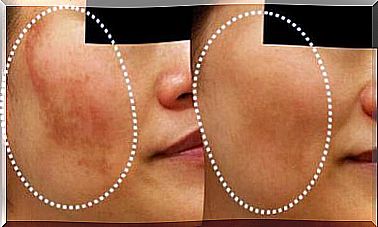Eczema And Stress: How Are They Related?

Eczema and stress are a problematic link for many people. They are two health problems that often go hand in hand and also feed on each other. It is, without a doubt, a very annoying combination for which there is no easy solution.
The skin is the most extensive organ of the body and best reflects the state of the mind. This is because the skin is directly related to the nervous system and sends information to the brain and vice versa.
At the same time , stress triggers the release of a range of substances that can eventually affect the skin. This leads to various anomalies, including eczema. As you can see, the relationship between eczema and stress is direct and very close.
Eczema
The word eczema is a generic term for any inflammation of the skin. Such inflammation is categorized as dermatitis, where atopic dermatitis refers to that which results from stress. In other words, when we talk about eczema and stress, we are actually talking about atopic dermatitis and stress.
Eczema appears when damage occurs to the outer protective barrier of the skin. This is when inflammation appears. The skin becomes red in the affected area and also becomes itchy. It usually appears on the arms and knees, as well as the groin and face.
In 85% of cases, the first episode of eczema occurs before the age of five. Experts also estimate that up to 20% of children and 1-2% of adults have experienced an episode of eczema at some point in their lives. There are cases where eczema becomes a chronic and recurrent condition (Spanish link).
Stress and the skin

There are several mechanisms through which stress affects the skin. It all stems from the fact that stress alters how the immune system works. This leads to two effects. On the one hand, it reduces the skin’s defenses and on the other hand, the skin becomes inflamed.
Under stressful conditions, there is also an increased production of adrenaline and corticosteroids. These have an effect on the skin receptors and cause changes in the skin. At the same time, research has shown that all inflammatory diseases tend to worsen with stress.
A study conducted by the Spanish Society of Allergy and Clinical Immunology (SEAIC) has indicated that at least 50% of people with atopic dermatitis also suffer from periods of depression and anxiety (Spanish link). They also noted that there has been an increase in cases of stress-associated eczema in recent years.
The relationship between eczema and stress

We now know that there is a link between eczema and stress, but the link has not yet been fully understood by science. Stress affects the skin in many ways. It causes conditions ranging from hives to atopic dermatitis, as well as problems such as:
- acne
- psoriasis
- seborrheic eczema
- rosacea
As noted above, there is a very direct connection between the nervous system and the skin. Eczema and stress also create a vicious circle from which it is very difficult to escape. The presence of this problem increases stress levels, especially in social situations.
At the same time, increasing stress levels can lead to an increase in eczema. All this together causes a considerable amount of suffering and produces feelings of frustration, insecurity and hopelessness. This is compounded by the fact that there is no curative treatment for eczema.
Facts to keep in mind
Stress eczema indicates that someone is under great pressure and is unable to meet the requirements. It is a warning sign that should not be overlooked. It means that there is a problem that has not yet been solved.
There is no specific treatment for stress eczema besides moisturizing the affected areas. The solution lies in tackling the cause, that is, the cause of the stress itself. The best thing to do in these cases is to introduce some lifestyle changes.
The regular practice of exercise is usually very effective in controlling moderate stress. Activities such as yoga or meditation are also highly recommended. It is a good idea to consult a psychologist, who can provide advice on how to manage stressful situations.









